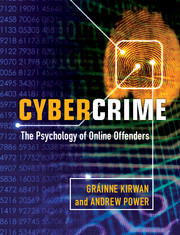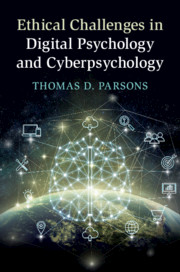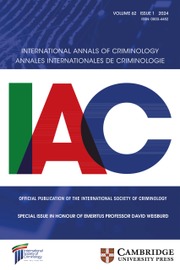Cybercrime
Cybercrime is a growing problem in the modern world. Despite the many advantages of computers, they have spawned a number of crimes, such as hacking and virus writing, and made other crimes more prevalent and easier to commit, including music piracy, identity theft and child sex offences. Understanding the psychology behind these crimes helps to determine what motivates and characterises offenders and how such crimes can be prevented. This textbook on the psychology of the cybercriminal is the first written for undergraduate and postgraduate students of psychology, criminology, law, forensic science and computer science. It requires no specific background knowledge and covers legal issues, offenders, effects on victims, punishment and preventative measures for a wide range of cybercrimes. Introductory chapters on forensic psychology and the legal issues of cybercrime ease students into the subject, and many pedagogical features in the book and online provide support for the student.
- No specific background knowledge of law or psychology is required, ensuring this textbook is accessible to undergraduate students of psychology, criminology, law, forensic science and computer science
- Criminological and forensic psychological theories are outlined to help students gain a better understanding of how theoretical models and concepts can be used to explain cybercriminal behaviour
- Covers both high profile cybercrimes (cyberterrorism, online child sex offences) as well as lower profile cybercrimes (online fraud, copyright infringement)
- Examines policy and the psychology of cybercriminal offenders but also the effects on victims, highlighting the wide variety of individuals who are affected by cybercrime
Reviews & endorsements
"Kirwan and Power have produced a truly contemporary text that shines a very bright and critical light on the relatively unexplored area of cybercrime. From the borderlands of terrestrial and cybercrime to the new world of virtual crime, this current and rapidly expanding area of academic concern is made accessible and critically comprehensible in both its new concepts and language."
--Dr. David A Holmes, Manchester Metropolitan University
"An excellent resource for behavioral scientists, lawyers and technologists alike. This will have a prominent place in my reference library."
--Dr. Marcus Rogers, Purdue University
"Kirwan and Power have put together an excellent collection of chapters on the psychology of cybercrime. They provide a good mix of empirical and theoretical work which would be a useful text for any student studying the topic."
--Professor Monica Whitty, University of Leicester
Product details
September 2013Paperback
9780521180214
280 pages
246 × 189 × 15 mm
0.51kg
13 b/w illus. 11 tables
Available
Table of Contents
- Preface
- 1. Psychology of cybercrime
- 2. Cybercrimes and cyberlaw
- 3. Hackers
- 4. Malware
- 5. Identity theft and fraud
- 6. Child predation and child pornography online
- 7. Cyberbullying and cyberstalking
- 8. Digital piracy and copyright infringement
- 9. Cyberterrorism
- 10. Crime in virtual worlds.





